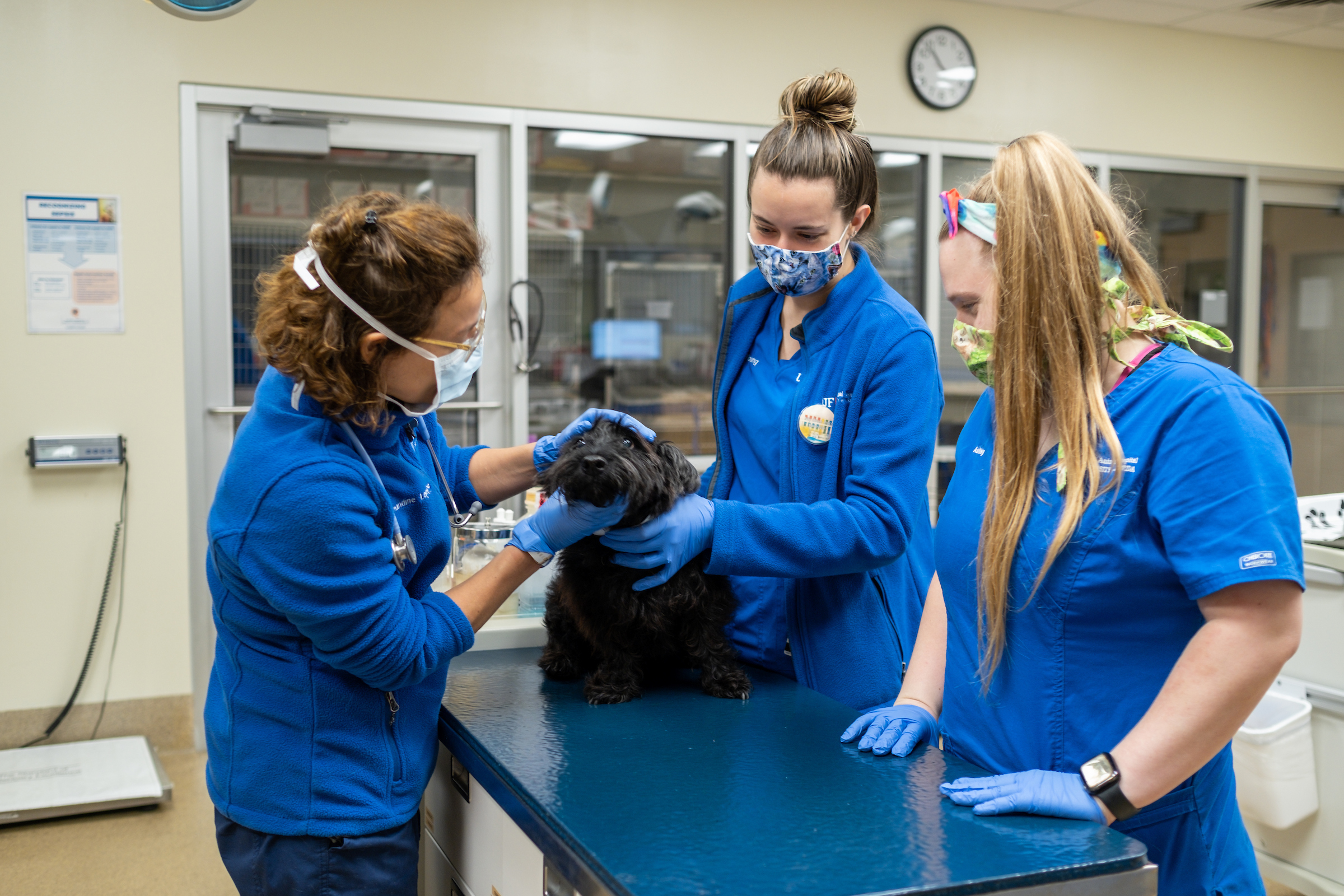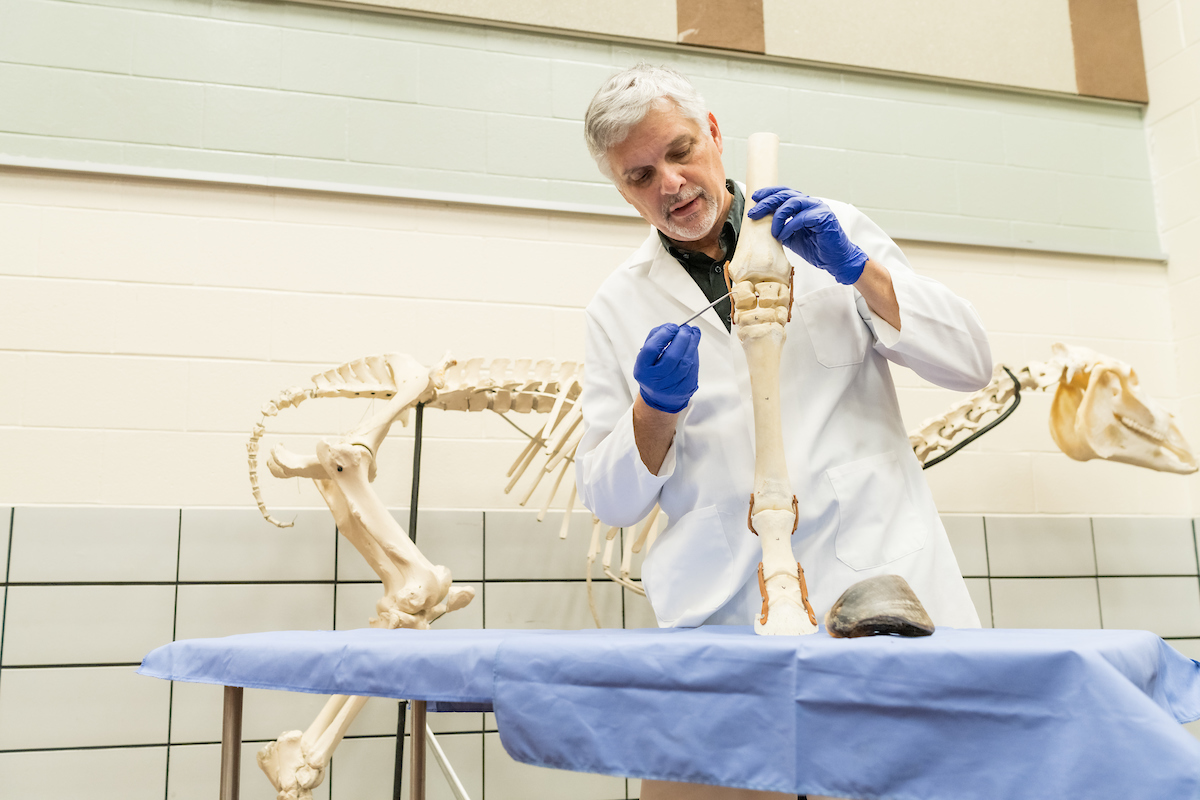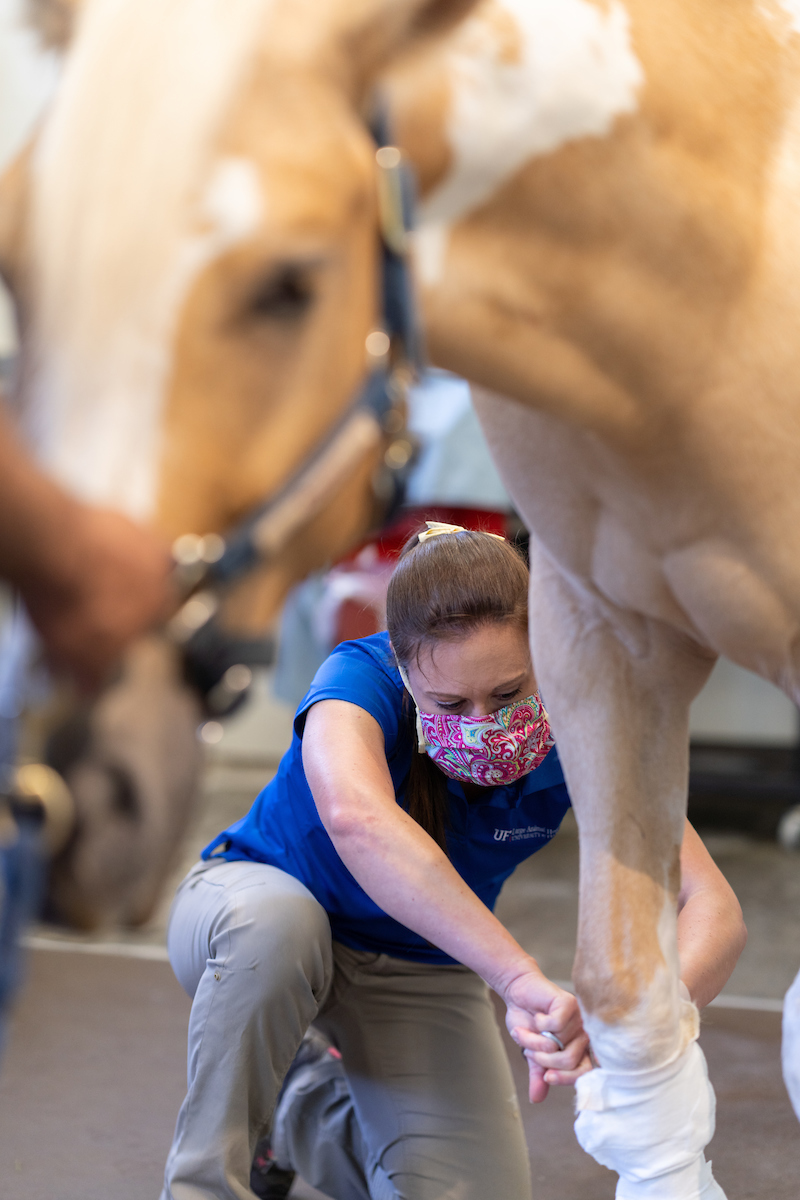College responds to COVID-19 pandemic

Dr. Amandine Lejeune, a clinical assistant professor of medical oncology, examines Kenzie, a Scottish terrier who had received treatment for a melanoma, at the UF Small Animal Hospital on April 14, 2020. Veterinary technicians Ashley Intihar and Kaylee Young assist. (Photo by Jesse Jones)
The University of Florida College of Veterinary Medicine and the UF Veterinary Hospitals remain open and continue to actively monitor the COVID-19 situation. In early May, working closely with UF and UF Health administration, we began implementing plans to gradually and carefully phase back in several areas of our operations. These plans are still unfolding, but the college remains committed to patient and client safety, as well as to the safety and well-being of our entire college family — our faculty, staff, interns, residents and students.
In accordance with federal, state and regional public health recommendations, as well as UF administration, we have modified our operations in several ways. Our administration and faculty are communicating regularly and closely with our students and our staff through town halls, virtual huddles and Zoom meetings to remain as transparent as possible and to ensure that each person has access to the most current information and best resources to help them navigate their personal and work-related situations during the pandemic. Additionally, specific stories of hard work and generosity have emerged. Below are some ways in which the college and the UFVH have responded since the pandemic began affecting us in mid-March.
TOWN HALLS AND HUDDLES
- Dr. Dana Zimmel, the college’s interim dean, has been holding collegewide town halls weekly since late March, providing updates on college and hospital operations as well as enterprise-wide overviews and answering questions from participants on a variety of topics.
- College administrators are communicating weekly with each class of veterinary medical students to summarize curriculum-related updates, solicit student feedback, address any questions and concerns and to provide resources these students can avail themselves of for further information.
- Other members of the college leadership team have also maintained regular communication virtually with faculty as well as graduate students to provide support and assistance however possible.
TEACHING

Dr. Rick Johnson demonstrates a large animal anatomy lesson such as he captured on video for students in his large animal anatomy class. (Photo by Jesse Jones)
- Faculty engaged in all aspects of teaching in the D.V.M. curriculum, on very short notice, transitioned to providing their course content in an online format.
- Our faculty have converted most laboratory courses to virtual experiences — a huge effort, which had to happen very fast. The clinical faculty have retooled the entire clerkship experience to continue clinical education for every clerkship in a virtual format. Both efforts took a tremendous amount of time and dedication of our faculty to accomplish. They have worked together as teams, creating new methods of clinical education.
- Vice Rounds: To mitigate effects of COVID-19-related shifts to online clinical veterinary training, a group of UF veterinarians, led by Dr. Alex Fox-Alvarez, an assistant professor of small animal surgery at the UF College of Veterinary Medicine, launched a cooperative to generate online clinical-based rounds for shared use: Veterinary Isolated Clinical Education, or VICE, Rounds. Although there is no substitute for experiential learning, VICE Rounds strive to emulate the clinical case experience using the unique resources and perspectives of veterinary educators from different specialties, universities, and locations. See story here.
RESEARCH

A packed minivan full of personal protective equipment right before delivery to UF Health. (Photo courtesy of Dr. Chris Adin)
- In response to a call for assistance by UF Health administration, efforts led by Dr. Maureen Long and Dr. Chris Adin resulted in several loads of personal protective equipment from CVM research labs, research faculty and a surgery teaching lab that were donated to UF Health to contribute to protection of front-line health care workers. See story here.
- In addition to helping gather personal protection equipment, or PPE, from UF College of Veterinary Medicine research laboratories to help their human health colleagues, CVM investigators associated with the Emerging Pathogens Institute are assisting in research efforts associated with UF Health COVID-19 molecular diagnostic testing in The Villages®.
- From Dr. Mary Brown’s laboratory in the department of infectious diseases and immunology, graduate student Mariah Watson serves on the Emerging Pathogens Institute’s PCR team, and Dr. Marissa Valentine-King is also volunteering for the epidemiology team.
STUDENTS:
- All classes of students in the D.V.M. program, including those on clinical rotations, had transitioned to attending classes online by March 17.
- Clinical faculty and those who deliver hands-on experiences, on very short notice, were able to develop content for the students showing their passion and dedication for the students and what they do.
- All UFCVM graduate students transitioned to online classes effective March 23.
- Dr. Jamie Stahl has continued offering counseling services for our D.V.M. students in a virtual format.
- Senior exit interviews are being conducted via Zoom, and the first- and second-year classes are participating in virtual end of year curriculum feedback sessions.
- A virtual commencement ceremony featuring a video presentation with congratulatory remarks by Dr. David Pascual, interim associate dean for research and graduate studies, was held to honor our spring M.S. and Ph.D. recipients.
UF VETERINARY HOSPITALS:

Dr. Kimberly Trolinger-Meadows, a final year sports medicine resident, changes the bandage on a horse named Popeye in UF’s Large Animal Hospital on April 29, 2020. Popeye has been receiving ongoing treatment and rehabilitation for a distal limb injury. (Photo by Jesse Jones)
- Our faculty, house officers and staff have continued to come in to the UF Veterinary Hospitals to provide clinical service for animals that have urgent or emergent conditions requiring care.
- The clinical faculty have also worked together with hospital administration to develop a new way to continue to provide clinical care to our patients at the same time reducing the risk of COVID-19 transmission within our hospital team and the hospital team interactions with clients. We have moved to drive up/drop off procedures for patients to minimize contact with owners. The hospital will be using teams of staff and clinicians to minimize the exposure to COVID-19 at the same time providing veterinary care to our community in a time of need.
- There has been an ongoing conversation at a national level from the American Veterinary Medical Association, the American Association of Veterinary Medical Colleges and the Veterinary Emergency and Critical Care Society about ventilators and how the veterinary medical profession might be able to contribute this type of equipment to aid human health workers treating patients with COVID-19. We will support our UF Health colleagues with ventilators appropriate for human use if asked.
- The UF Pet Emergency Treatment Center in Ocala continues to function in the same manner as Gainesville, which has allowed us to provide these valuable services to that community.
- UF Veterinary Hospital faculty showed their thanks to staff and supported local restaurants by donating lunches that were delivered to hospital workers. Drs. Sally DeNotta, Chris Sanchez, Kris Cooke and Gareth Buckley and Carlos Souza all have been involved in such efforts. See story here.
SHELTER MEDICINE:
- Veterinarians with UF’s Maddie’s Shelter Medicine Program have provided several webinars aimed at helping veterinary medical professionals navigate the COVID-19 crisis.
- A March 25 webinar, titled “COVID-19 Community Response Webinar: Guidance for Nonprofit, Government, and In Practice Veterinary Personnel,” featured UF’s Dr. Julie Levy, along with speakers representing leaders from the Association for Animal Welfare Advancement, the World Small Animal Veterinary Association and MightyVet. Co-hosted by Covetrus, the free webinar was RACE-approved for veterinary professionals. More than 10,000 animal health professionals had viewed or registered for the webinar in under 72 hours.
- Sara Pizano, founder of Team Shelter USA, an advisor to the Million Cat Challenge and the assessment/mentorship lead for UF’s program, provided a webinar on “Best Practice Strategies Before, During, and After the Pandemic.”


















